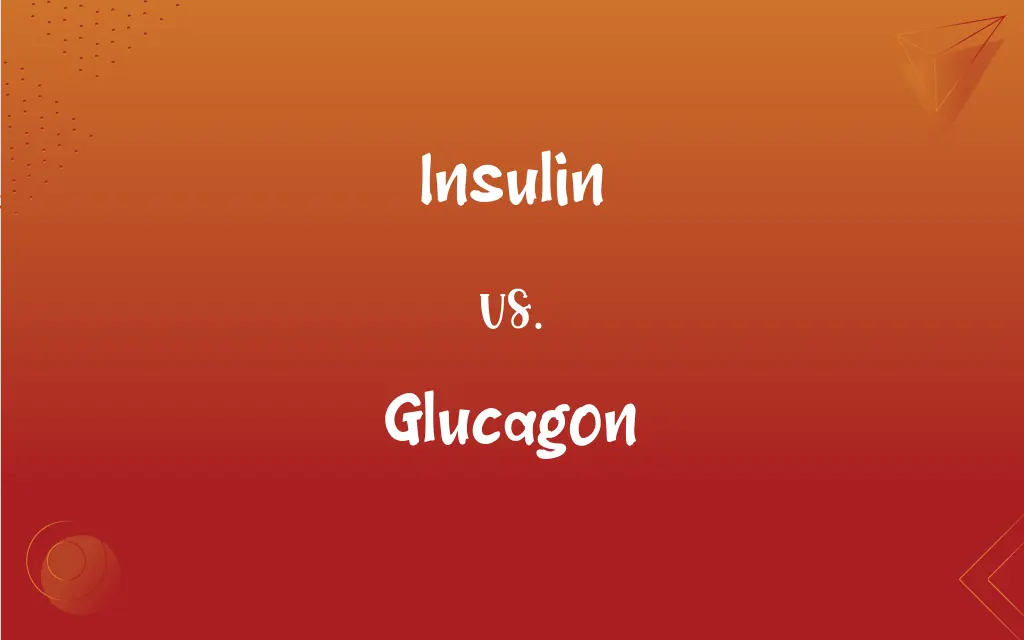Insulin vs. Glucagon: What's the Difference?
Edited by Janet White || By Harlon Moss || Updated on October 19, 2023
Insulin is a hormone that helps cells take in glucose, decreasing blood sugar levels, while glucagon promotes the release of glucose into the blood, increasing blood sugar levels.

Key Differences
Insulin is a hormone produced by the beta cells of the pancreas that promotes the uptake of glucose into cells, effectively reducing blood sugar levels. Glucagon, on the other hand, is produced by the alpha cells of the pancreas and functions to increase blood sugar levels by promoting the release of glucose stored in the liver.
The primary role of insulin is to manage and regulate glucose metabolism by enabling body cells, particularly muscle and fat cells, to absorb glucose. Glucagon works to ensure that glucose is available in the bloodstream, particularly during periods of fasting or between meals.
When blood sugar levels are high, such as after consuming a meal, the pancreas releases insulin to help shuttle the excess glucose into cells. Conversely, when blood sugar levels are low, the pancreas secretes glucagon to signal the liver to release stored glucose.
The actions of insulin and glucagon are critical for maintaining homeostasis in the body. While insulin helps in lowering elevated blood sugar, glucagon acts as a counter-regulatory hormone, ensuring blood sugar doesn't drop too low.
Imbalances in insulin can lead to conditions like diabetes mellitus, where the body cannot adequately regulate blood sugar levels. Similarly, disruptions in glucagon function can also impact blood sugar regulation, but its imbalances are less commonly the primary cause of metabolic diseases.
ADVERTISEMENT
Comparison Chart
Produced by
Beta cells of the pancreas.
Alpha cells of the pancreas.
Primary Function
Lowers blood sugar levels.
Raises blood sugar levels.
Action on Liver
Inhibits glucose production.
Promotes glucose release.
Effect on Cell Glucose Uptake
Promotes glucose uptake into cells.
Does not directly influence cellular uptake.
Associated Conditions
Diabetes mellitus (insulin deficiency).
Hyperglucagonemia (rare).
ADVERTISEMENT
Insulin and Glucagon Definitions
Insulin
A protein produced by the pancreas for blood sugar regulation.
The body releases insulin after meals to help utilize the glucose from food.
Glucagon
A hormone that raises blood glucose levels.
Glucagon is secreted when blood sugar levels are low to restore balance.
Insulin
A hormone that regulates glucose metabolism.
Without sufficient insulin, blood sugar levels can become dangerously high.
Glucagon
A substance that signals the liver to release stored glucose.
In emergencies, a glucagon injection can quickly raise blood sugar.
Insulin
A substance responsible for glucose uptake into cells.
People with diabetes might need insulin injections to manage their condition.
Glucagon
A therapeutic agent used to treat severe hypoglycemia.
People with diabetes might carry a glucagon emergency kit for sudden drops in blood sugar.
Insulin
A therapeutic agent used to treat diabetes mellitus.
Doctors prescribe insulin therapy for patients with type 1 diabetes.
Glucagon
A protein produced by the pancreas to counteract insulin's effects.
Glucagon ensures that the body has access to glucose between meals.
Insulin
A key hormone in energy storage and utilization in the body.
When insulin functions correctly, it helps maintain steady energy levels throughout the day.
Glucagon
A key hormone in glucose mobilization and response to fasting.
During fasting, glucagon levels rise to provide energy for bodily functions.
Insulin
A polypeptide hormone that is secreted by the beta cells of the islets of Langerhans in the pancreas and functions in the regulation of carbohydrate and fat metabolism, especially the conversion of glucose to glycogen, which lowers the blood glucose level. It consists of two linked polypeptide chains called A and B.
Glucagon
A hormone produced by the pancreas that stimulates an increase in blood sugar levels, thus opposing the action of insulin.
Glucagon
(biochemistry) A peptide hormone, produced by the pancreas, that opposes the action of insulin by stimulating the production of sugar
Glucagon
A hormone secreted by the pancreas; stimulates increases in blood sugar levels in the blood (thus opposing the action of insulin)
FAQs
Can a person lack insulin?
Yes, type 1 diabetes results from the body not producing enough insulin.
What triggers glucagon release?
Glucagon is released in response to low blood sugar levels.
Can too much glucagon be harmful?
Excessive glucagon can lead to high blood sugar levels and related complications.
Can insulin and glucagon levels be measured?
Yes, both can be measured using specific blood tests to aid in diabetes diagnosis and management.
What is insulin?
Insulin is a hormone that helps regulate blood sugar by promoting glucose uptake into cells.
What factors affect insulin production?
Factors like genetics, autoimmune reactions, and some viral infections can impact insulin production.
Do all diabetics need insulin therapy?
Not all. People with type 1 diabetes require insulin, while those with type 2 may manage with other treatments.
What is glucagon?
Glucagon is a hormone that raises blood sugar levels by signaling the liver to release stored glucose.
How are insulin and glucagon related?
Insulin and glucagon work in tandem to maintain blood sugar balance in the body.
How is insulin administered?
Insulin is often administered via injections or insulin pumps.
Why is insulin important?
Insulin is crucial for regulating glucose metabolism and maintaining energy balance.
How do insulin and glucagon respond to meals?
After meals, insulin levels rise to handle increased glucose, while glucagon levels typically decrease.
Is there a synthetic form of glucagon?
Yes, synthetic glucagon is available and used primarily for treating severe hypoglycemia.
Can insulin be taken orally?
No, insulin is typically administered through injections because the stomach would break it down.
How does fasting influence glucagon?
Fasting typically raises glucagon levels, ensuring the body has access to stored glucose for energy.
Why would someone need a glucagon injection?
A glucagon injection can treat severe hypoglycemia when blood sugar drops dangerously low.
What happens if the body doesn't respond to insulin?
Insulin resistance can develop, a hallmark of type 2 diabetes.
What happens with too much insulin in the body?
Excessive insulin can cause hypoglycemia, characterized by low blood sugar levels.
How do insulin and glucagon maintain homeostasis?
They counteract each other's effects to ensure stable blood sugar levels, crucial for body's functions.
Can one live without glucagon?
While glucagon is important, its absence doesn't have the immediate life-threatening implications as insulin deficiency.
About Author
Written by
Harlon MossHarlon is a seasoned quality moderator and accomplished content writer for Difference Wiki. An alumnus of the prestigious University of California, he earned his degree in Computer Science. Leveraging his academic background, Harlon brings a meticulous and informed perspective to his work, ensuring content accuracy and excellence.
Edited by
Janet WhiteJanet White has been an esteemed writer and blogger for Difference Wiki. Holding a Master's degree in Science and Medical Journalism from the prestigious Boston University, she has consistently demonstrated her expertise and passion for her field. When she's not immersed in her work, Janet relishes her time exercising, delving into a good book, and cherishing moments with friends and family.































































